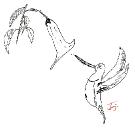 |
||||
 |
|
CHAPTER ONE
--2--
Our network of trading amongst ourselves, as well as with the Divine, evolved from a simple trade of one item for another, to the complex global trade in raw materials and commodities we enjoy today. The one invention that allowed trading and society to evolve in complexity was a very simple one: currency ---or, if you prefer, money.
With all our progress, the world appears to be in very bad shape. Massive social injustices, unstable global and local economies, wars and environmental disruption including climate change, species extinction and global warming seem to threaten our future.
Why?
I suggest there is one external root cause: the false separation of human society from the Divine that was brought about by the invention of currency. The cause is not trading, which is the essence of life, or the actual tokens (coins) of currency which of course are among our most useful innovations. The problem is that currency as we know it has made it possible to easily separate not only our economies, but also our civic and religious institutions from the life-sustaining ecoystem services of our natural environment (the gifts of the Divine). And we have, with gusto.
In short, the world's currencies do not promote sustainablility.
To create a sustainable robust economy (and thereby a sustainable, healthy and diverse civilization) will require a sustainable currency. Anything we do to heal our society and the physical environment will not be sufficient in the long run if our currency is not formally tied to the health and wellbeing of our (only) planet.
A currency that will help ensure a livable future must be based on the gifts of the Divine.
In the following chapters I will develop the above concepts, and will show how I envision the creation and implementation of a sustainable currency.
End of Chapter 1
Chapter 2 will arrive soon
